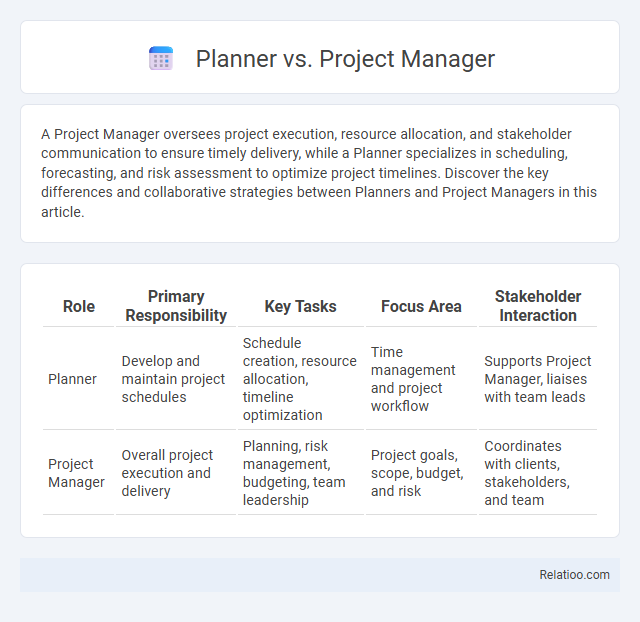A Project Manager oversees project execution, resource allocation, and stakeholder communication to ensure timely delivery, while a Planner specializes in scheduling, forecasting, and risk assessment to optimize project timelines. Discover the key differences and collaborative strategies between Planners and Project Managers in this article.
Table of Comparison
| Role | Primary Responsibility | Key Tasks | Focus Area | Stakeholder Interaction |
|---|---|---|---|---|
| Planner | Develop and maintain project schedules | Schedule creation, resource allocation, timeline optimization | Time management and project workflow | Supports Project Manager, liaises with team leads |
| Project Manager | Overall project execution and delivery | Planning, risk management, budgeting, team leadership | Project goals, scope, budget, and risk | Coordinates with clients, stakeholders, and team |
Introduction to Planners and Project Managers
Planners specialize in creating detailed schedules, forecasting resource needs, and monitoring project progress to ensure timelines are met efficiently. Project managers oversee the entire project lifecycle, coordinating teams, managing budgets, and aligning objectives with business goals. While planners focus on tactical scheduling and logistics, project managers handle strategic decision-making and stakeholder communication.
Core Responsibilities of Planners
Planners primarily focus on developing detailed schedules, resource allocation, and risk identification to ensure project timelines are met efficiently. They analyze project data, create baseline plans, and monitor progress to anticipate delays and suggest mitigation strategies. Unlike Project Managers who oversee overall project execution and stakeholder communication, Planners specialize in the technical aspects of timeline and workflow optimization.
Key Roles of Project Managers
Project managers oversee the entire project lifecycle, ensuring timely delivery, budget adherence, and stakeholder communication, while planners primarily focus on scheduling and resource allocation to optimize workflows. Your success relies on the project manager's ability to integrate risk management, quality control, and team coordination, providing strategic leadership beyond the detailed task scheduling handled by planners. Effective project management balances tactical planning with visionary oversight to drive project objectives and organizational goals.
Differences in Daily Tasks
A Planner primarily focuses on scheduling tasks, allocating resources, and ensuring timelines are met through detailed work plans. A Project Manager oversees the entire project lifecycle, handling stakeholder communication, risk management, and team coordination to achieve project goals. Your role in project success depends on whether you prioritize strategic oversight, detailed scheduling, or both.
Overlapping Skills and Qualities
Project Managers and Planners both excel in time management, resource allocation, and risk assessment, ensuring projects meet deadlines and stay within budget. Both roles require strong communication skills and the ability to coordinate between teams and stakeholders to maintain project alignment and progress. Analytical thinking and problem-solving are crucial qualities shared by both, enabling them to adapt plans and handle unforeseen challenges effectively.
Tools Used by Planners vs Project Managers
Planners typically rely on tools like Gantt charts, critical path method software, and resource allocation platforms to optimize schedules and forecast project timelines. Project managers use comprehensive project management software such as Microsoft Project, Asana, or Jira, which integrate task tracking, budgeting, and communication features to oversee project execution and team collaboration. Your choice between a planner and a project manager should consider the specific toolsets that align with your project's complexity and management needs.
Impact on Project Lifecycle
A Project Manager oversees the entire project lifecycle, ensuring alignment with strategic goals, resource allocation, and risk management to drive successful completion. Planners focus on creating detailed schedules, identifying dependencies, and optimizing timelines to maximize efficiency during the project execution phase. Their combined impact enhances project delivery by streamlining workflows, anticipating challenges, and maintaining clarity across all stages from initiation to closure.
Collaboration and Workflow
Effective collaboration and streamlined workflow depend on the distinct roles of planners, project managers, and schedulers. Project managers oversee overall strategy and resource allocation, ensuring Your team meets deadlines and goals, while planners focus on creating detailed plans that map out tasks and dependencies. Schedulers specialize in sequencing activities and managing timelines, facilitating smooth coordination across multiple stakeholders to enhance productivity.
Career Paths and Development
Project Managers oversee the entire project lifecycle, coordinating teams, resources, and timelines to ensure successful delivery, making their career paths often lead to senior management roles like Program Manager or PMO Director. Planners focus on detailed scheduling, resource allocation, and forecasting, typically advancing to specialized roles such as Senior Planner or Scheduling Manager with expertise in software like Primavera or MS Project. Career development for both roles emphasizes certifications (PMP for Project Managers, PMI-SP for Planners), leadership skills, and domain-specific knowledge, with crossover opportunities depending on industry demands and organizational structures.
Choosing Between a Planner and a Project Manager
Choosing between a planner and a project manager depends on the scope and complexity of your project needs. A planner primarily focuses on developing schedules, resource allocation, and forecasting, ensuring tasks and milestones are clearly organized. Your choice should consider if you need detailed task coordination and timeline management (planner) or comprehensive oversight including team leadership, risk management, and stakeholder communication (project manager).

Infographic: Planner vs Project Manager
 relatioo.com
relatioo.com